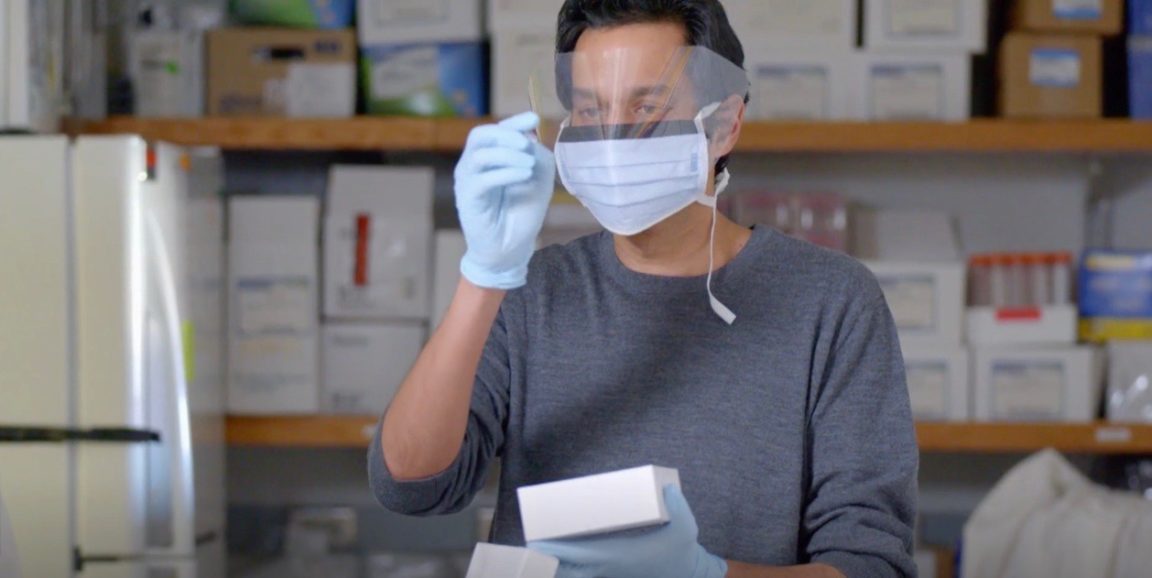It seems like there's no shortage of news about the novel coronavirus that is sweeping the globe. But if you're like me, you're paying special attention to any and all information about the race to develop a vaccine -- a crucial step that will save lives and (hopefully) restore life back to something like pre-pandemic times.
Recently, Stanford biochemist Rhiju Das, PhD, joined the global effort to create a safe, widely available vaccine for SARS-CoV-2, the novel coronavirus that causes COVID-19, with a new project called OpenVaccine.
Das studies how string-like RNA molecules, which encode the genetic information needed to make proteins, fold into three-dimensional shapes to carry out biological functions within a cell. Currently, RNA molecules are being investigated as potential vaccines for several diseases -- including COVID-19 -- although none has yet been approved for use in humans.
An important stumbling block is the fact that RNA is not just flexible, but also extremely fragile. Under normal circumstances, these molecules rapidly degrade within a matter of minutes to hours. Das and his lab members -- in collaboration with researchers from the laboratory of geneticist Maria Barna, PhD -- hope to design a COVID-19 vaccine that can prime our immune systems to fight the virus, while also remaining stable enough to survive a journey to billions of people around the world.
Their efforts are highlighted in the recent NOVA special Decoding COVID-19.
As Das explains in the video, "The advantage of RNA vaccines is that they are super fast to make, which is absolutely critical in the current pandemic situation."
However, he says, RNA vaccines remain stable only if they're freeze dried, or kept at ultra-low temperatures. Unfortunately, it remains difficult to transport or deliver vaccines in this manner. Without some way to increase their shelf-life, even the best RNA-based vaccine will be of limited use, particularly in developing countries without reliable access to air-conditioning or refrigeration.
Das hopes to address this problem through his work, and he's getting help from the online interactive gaming platform he co-invented called Eterna.
Eterna brings together people from all over the world -- no scientific expertise necessary -- to design novel, clinically important RNA structures by following a few, video game-like rules governing how the molecules fold.
Each RNA molecule can assume many different conformations; some are more resistant to degradation than others. Those predicted to be the most stable by the game's scoring system are tested in the labs of Das and Barna. Although no scientific expertise is necessary, great puzzle solving skills are needed for players to get through the initial puzzles and unlock the new OpenVaccine challenges.
We've written before about the intriguing crowd-sourced aspect of Eterna, which was launched nearly a decade ago. Since then, gamers' insights have led to the publication of more than 20 scientific articles describing new configurations of the flexible RNA molecules. Now Eterna, which has more than 250,000 players, has pivoted to the OpenVaccine challenge, bringing its crowdsourcing weight to bear on a vaccine for the virus that causes COVID-19.
"We're trying to recruit -- potentially -- millions of people to come play a video game," Das explained in the video. "The solutions they are providing very well could become a medicine that is injected into billions of people."
Eterna designers are working to optimize the game's interface for mobile phone use and to translate the game into Spanish, Chinese, Arabic and Portuguese. Interested players can sign up on the Eterna website.
Image of Stanford biochemist Rhiju Das from a pbs.org NOVA segment on COVID-19




